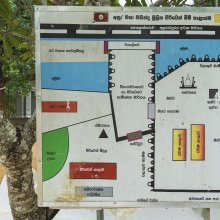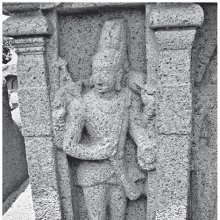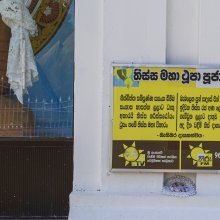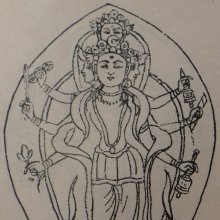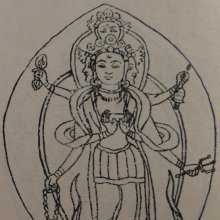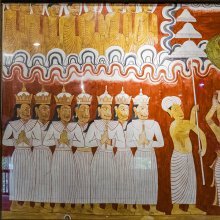Maha, Māhā: 24 definitions
Introduction:
Maha means something in Buddhism, Pali, Hinduism, Sanskrit, the history of ancient India, Marathi, Jainism, Prakrit, Hindi, biology. If you want to know the exact meaning, history, etymology or English translation of this term then check out the descriptions on this page. Add your comment or reference to a book if you want to contribute to this summary article.
Images (photo gallery)
(+36 more images available)
In Hinduism
Purana and Itihasa (epic history)
Source: Cologne Digital Sanskrit Dictionaries: The Purana Index1a) Maha (मह).—A son of Bharatāgni.*
- * Vāyu-purāṇa 29. 8.
1b) One of the twenty Amitābha gods.*
- * Brahmāṇḍa-purāṇa IV. 1. 17; Vāyu-purāṇa 100. 16.
1c) (Maharloka) the fourth of the seven worlds;1 Manus went to it after tapas at Meru; Manus retire to this place when the periods of their duties are over; Gods like Ajitas, Yāma gaṇas and Āyuṣmantas besides Śukra, Cākṣuṣa and others live in Maharloka;2 the space between Dhruva and Jana; the residents of this loka possess mental powers to create any desired thing; even gods sacrifice to each other;3 created from Vyāhṛti.4
- 1) Brahmāṇḍa-purāṇa II. 19. 155; Matsya-purāṇa 60. 2; 61. 1; 184. 23; Vāyu-purāṇa 101. 17.
- 2) Brahmāṇḍa-purāṇa II. 21. 22; 35. 179, 197; IV. 1. 25, 33, 122. Vāyu-purāṇa 101. 41, 52, 208; 109. 48.
- 3) Brahmāṇḍa-purāṇa IV. 2. 2, 21, 40, 42-3; Vāyu-purāṇa 101. 44.
- 4) Brahmāṇḍa-purāṇa IV. 2. 2, 21; Vāyu-purāṇa 101. 23.

The Purana (पुराण, purāṇas) refers to Sanskrit literature preserving ancient India’s vast cultural history, including historical legends, religious ceremonies, various arts and sciences. The eighteen mahapuranas total over 400,000 shlokas (metrical couplets) and date to at least several centuries BCE.
Pancaratra (worship of Nārāyaṇa)
Source: Wisdom Library: PāñcarātraMahā (महा) refers to an aspect of nṛsiṃha (‘man-lion’), according to the Vihagendra-saṃhitā 4.17, which mentions seventy-four forms (inlcuding twenty forms of vyūha). He is also known as Mahānṛsiṃha or Mahānarasiṃha. Nṛsiṃha is a Tantric deity and refers to the furious (ugra) incarnation of Viṣṇu.
The 15th-century Vihagendra-saṃhīta is a canonical text of the Pāñcarātra corpus and, in twenty-four chapters, deals primarely with meditation on mantras and sacrificial oblations.

Pancaratra (पाञ्चरात्र, pāñcarātra) represents a tradition of Hinduism where Narayana is revered and worshipped. Closeley related to Vaishnavism, the Pancaratra literature includes various Agamas and tantras incorporating many Vaishnava philosophies.
In Buddhism
Theravada (major branch of Buddhism)
Source: Dhamma Dana: Pali English GlossaryF Great, superior, of large breadth, noble.
Source: Journey to Nibbana: Patthana DhamaMaha means great.
Theravāda is a major branch of Buddhism having the the Pali canon (tipitaka) as their canonical literature, which includes the vinaya-pitaka (monastic rules), the sutta-pitaka (Buddhist sermons) and the abhidhamma-pitaka (philosophy and psychology).
India history and geography
Source: Cologne Digital Sanskrit Dictionaries: Indian Epigraphical GlossaryMahā.—(PJS), abbreviation of Mahājana (especially in medieval Jain inscriptions). Cf. Mahā-Mūla (i. e. the elder Mūla) distinguished from Kṣudra-Mūla (i. e. the younger Mūla); also Mahā-Dharmagiri and Kṣudra-Dharmagiri, etc. Note: mahā is defined in the “Indian epigraphical glossary” as it can be found on ancient inscriptions commonly written in Sanskrit, Prakrit or Dravidian languages.
--- OR ---
Maha.—(IA 18), abbreviations of Mahattara or Mahattama. Note: maha is defined in the “Indian epigraphical glossary” as it can be found on ancient inscriptions commonly written in Sanskrit, Prakrit or Dravidian languages.
See also (synonyms): Mahaṃ.
Source: academia.edu: Tessitori Collection I (history)Māha (माह) refers to one of the twelve months mentioned in the Bārāmāso (dealing with poetry and riddles), which is included in the collection of manuscripts at the ‘Vincenzo Joppi’ library, collected by Luigi Pio Tessitori during his visit to Rajasthan between 1914 and 1919.—The months are described in the following sequence: [e.g., Māha] [...]. The tone is that of an evocation of the sounds and things seen during each of the twelve months akin to love poetry (sājana, mere sājana) and profane twelve months songs. But as the poem unfolds the religious tone increases, with reference to ‘the good teacher’ and presence of Jain terms so that this work is also close to Aupadeśik Bāramāso [...]

The history of India traces the identification of countries, villages, towns and other regions of India, as well as mythology, zoology, royal dynasties, rulers, tribes, local festivities and traditions and regional languages. Ancient India enjoyed religious freedom and encourages the path of Dharma, a concept common to Buddhism, Hinduism, and Jainism.
Biology (plants and animals)
Source: Google Books: CRC World Dictionary (Regional names)Maha in India is the name of a plant defined with Ziziphus rugosa in various botanical sources. This page contains potential references in Ayurveda, modern medicine, and other folk traditions or local practices It has the synonym Ziziphus latifolia Blanco (among others).
Example references for further research on medicinal uses or toxicity (see latin names for full list):
· FBI (1875)
· Flora Indica, or ‘Descriptions of Indian Plants’ (1824)
· Journal of Cytology and Genetics (1990)
· Flora de Filipinas, ed. 2 (1845)
· Hortus Bengalensis, or ‘a Catalogue of the Plants Growing in the Hounourable East India Company's Botanical Garden at Calcutta’ (1814)
· Flora Indica, or ‘Descriptions of Indian Plants’ (1832)
If you are looking for specific details regarding Maha, for example side effects, health benefits, extract dosage, pregnancy safety, chemical composition, diet and recipes, have a look at these references.

This sections includes definitions from the five kingdoms of living things: Animals, Plants, Fungi, Protists and Monera. It will include both the official binomial nomenclature (scientific names usually in Latin) as well as regional spellings and variants.
Languages of India and abroad
Pali-English dictionary
Source: BuddhaSasana: Concise Pali-English Dictionarymaha : (m.) a religious festival. || mahā (mahanta becomes mahā in compounds; the last vowel ā is often shortened euphonically.)
Source: Sutta: The Pali Text Society's Pali-English DictionaryMaha, (m. & nt.) (fr. mah, see mahati & cp. Vedic nt. mahas) 1. worthiness, venerableness Miln. 357.—2. a (religious) festival (in honour of a Saint, as an act of worship) Mhvs 33, 26 (vihārassa mahamhi, Loc.); VvA. 170 (thūpe ca mahe kate), 200 (id.). mahā° a great festival Mhvs 5, 94. bodhi° festival of the Bo tree J. IV, 229. vihāra° festival held on the building of a monastery J. I, 94; VvA. 188. hatthi° a festival called the elephant f. J. IV, 95. (Page 525)

Pali is the language of the Tipiṭaka, which is the sacred canon of Theravāda Buddhism and contains much of the Buddha’s speech. Closeley related to Sanskrit, both languages are used interchangeably between religions.
Marathi-English dictionary
Source: DDSA: The Molesworth Marathi and English Dictionarymahā (महा).—a (S See explanation under mahata) Great, big, large. 2 A great one; a mighty personage; as hē ēka mahā āhēta; tō kāya ēka mahā āhē. Used gravely or jeeringly.
Source: DDSA: The Aryabhusan school dictionary, Marathi-Englishmahā (महा).—a Great, big; a great one.
Marathi is an Indo-European language having over 70 million native speakers people in (predominantly) Maharashtra India. Marathi, like many other Indo-Aryan languages, evolved from early forms of Prakrit, which itself is a subset of Sanskrit, one of the most ancient languages of the world.
Sanskrit dictionary
Source: DDSA: The practical Sanskrit-English dictionaryMaha (मह).—[mah-ghañarthe ka]
1) A festival, festive occasion; बन्धुताहृदयकौमुदीमहः (bandhutāhṛdayakaumudīmahaḥ) Mālatīmādhava (Bombay) 9.21; Uttararāmacarita 6.4; स खलु दूरगतोऽ- प्यतिवर्तते महमसाविति बन्धुतयोदितैः (sa khalu dūragato'- pyativartate mahamasāviti bandhutayoditaiḥ) Śiśupālavadha 6.19; मदनमहम् (madanamaham) Ratnāvalī 1.
2) An offering, a sacrifice.
3) A buffalo.
4) Light, lustre; cf. महस् (mahas) also.
Derivable forms: mahaḥ (महः).
--- OR ---
Mahā (महा).—A cow.
--- OR ---
Mahā (महा).—The substitute of महत् (mahat) at the beginning of Karmadhāraya and Bahuvrīhi compounds, and also at the beginning of some other irregular words. (Note : The number of compounds of which mahā is the first member is very large, and may be multiplied ad infinitum. The more important of them, or such as have peculiar significations, are given below.)
--- OR ---
Māhā (माहा).—A cow.
Source: Cologne Digital Sanskrit Dictionaries: Edgerton Buddhist Hybrid Sanskrit DictionaryMahā (महा).—[, read sahā, q.v.: lokadhātu mahā (so text) nāma Mahāvastu iii.342.8, referring to the earth, in which Śākya- muni is preaching the Law.]
Source: Cologne Digital Sanskrit Dictionaries: Shabda-Sagara Sanskrit-English DictionaryMaha (मह).—m.
(-haḥ) 1. A festival. 2. Light, lustre. 3. A buffalo. 4. Sacrifice, oblation. f.
(-hā) 1. A cow. 2. A plant, (Hedysarum lagopodioides.) E. mah to worship, aff. ghañ: see mahasa and mahi .
--- OR ---
Māhā (माहा).—f.
(-hā) A cow. E. mā prohibitive prefix, han to kill, affs. ḍa and ṭāp .
Source: Cologne Digital Sanskrit Dictionaries: Benfey Sanskrit-English DictionaryMaha (मह).—[mah + a], I. adj. f. hī, Great,
--- OR ---
Mahā (महा).—[mahā-], a substitute for mahant, when former part of compounds of the Bahuvrīhi and Karmadhāraya classes; e. g. mahā-rāja, m. A great king,
Maha (मह).—1. [masculine] feast, festival.
--- OR ---
Maha (मह).—2. [adjective] great, rich, abundant, [abstract] tā† [feminine]; [neuter] [plural] great deeds.
--- OR ---
Mahā (महा).—(only °— & [accusative] sgl. mahām) = mahant.
Source: Cologne Digital Sanskrit Dictionaries: Monier-Williams Sanskrit-English Dictionary1) Maha (मह):—[from mah] 1. maha mfn. great, mighty, strong, abundant, [Ṛg-veda]
2) [v.s. ...] m. (cf. makha, magha) a feast, festival, [Mahābhārata]
3) [v.s. ...] the festival of spring, [Śiśupāla-vadha; Harivaṃśa; Varāha-mihira]
4) [v.s. ...] a [particular] Ekāha, [Śāṅkhāyana-śrauta-sūtra]
5) [v.s. ...] a sacrifice, [cf. Lexicographers, esp. such as amarasiṃha, halāyudha, hemacandra, etc.]
6) [v.s. ...] a buffalo, [cf. Lexicographers, esp. such as amarasiṃha, halāyudha, hemacandra, etc.]
7) [v.s. ...] light, lustre, brilliance, [cf. Lexicographers, esp. such as amarasiṃha, halāyudha, hemacandra, etc.]
8) Mahā (महा):—[from maha > mah] a f. a cow, [cf. Lexicographers, esp. such as amarasiṃha, halāyudha, hemacandra, etc.]
9) Maha (मह):—[from mah] n. [plural] great deeds, [Ṛg-veda]
10) [from mah] 2. maha in [compound] for mahā before ṛ and before r for ṛ.
11) Mahā (महा):—[from mah] b in [compound] for mahat (in, [Ṛg-veda ii, 22, 1 and iii, 23; 49, 1] used for mahat as an independent word in [accusative] sg. mahām = mahāntam).
12) c mahā-kaṅkara etc. See p. 794, col. 3.
13) Māhā (माहा):—1. māhā f. a cow, [cf. Lexicographers, esp. such as amarasiṃha, halāyudha, hemacandra, etc.] (cf. mahā, mahī, māheyī).
14) 2. māhā Vṛddhi form of mahā, in [compound]
Source: Cologne Digital Sanskrit Dictionaries: Yates Sanskrit-English Dictionary1) Maha (मह):—(haḥ) 1. m. A festival; light; a buffalo; a sacrifice. f. A cow; a plant (Hedysarum legipodioides).
2) Māhā (माहा):—(hā) 1. f. A cow.
Source: DDSA: Paia-sadda-mahannavo; a comprehensive Prakrit Hindi dictionary (S)Maha (मह) in the Sanskrit language is related to the Prakrit word: Maha.
[Sanskrit to German]
Sanskrit, also spelled संस्कृतम् (saṃskṛtam), is an ancient language of India commonly seen as the grandmother of the Indo-European language family (even English!). Closely allied with Prakrit and Pali, Sanskrit is more exhaustive in both grammar and terms and has the most extensive collection of literature in the world, greatly surpassing its sister-languages Greek and Latin.
Hindi dictionary
Source: DDSA: A practical Hindi-English dictionary1) Mahā (महा):——an allomorph of [mahat] as it appears in numerous compounds; ~[kavi] a great poet; an epic poet; ~[kāya] mammoth, a colossus; ~[kāla] the Annihilator; the Time Indefinite; ~[kāvya] an epic; ~[kuṣṭha] leprosy; ~[graṃtha] a voluminous book; a significant work; ~[jāla] a drag-net; ~[deva] an epithet of Lord Shiv; ~[devī] an epithet of goddess Parvati: -Shiv's spouse; queen consort; ~[deśa] sub-continent; ~[nagara/nagarī] a metropolis; cosmopolitan city; ~[dhamanī] the aorta; ~[dhikārapatra] magna charta; ~[nidrā] death; ~[nyāyavādī] attorney general; ~[patha] a highway; ~[parādha] high crime; ~[pātaka] a great sin (five such sins have been enumerated by the Hindu scriptures-killing a Brahman, consuming liquor, theft, committing incest with the preceptor’s wife and associating with one who has committed any of these sins); ~[pātakī] a great sinner; ~[pāpa] see) ~[pātaka; ~pāpī] see ~[pātakī; ~puruṣa] a great man; ~[puruṣocita] befitting a great man; ~[prayāṇa] see ~[prasthāna; ~pralaya] the great deluge; ~[prasthāna] death; the final journey; ~[prājña] a great scholar endowed with great wisdom; ~[prāṇa] an aspirate; possessing tremendous vitality; ~[balādhikṛta] Commander-in-Chief, Supreme Commander; ~[balī] very powerful, a great warrior; an epithet of Lord Hanuman; ~[bāhu] large-armed, valiant, valorous; ~[brāhmaṇa] a Brah:man who performs cremation rituals and accepts payment therefor in cash or kind; ~[bhāga] fortunate, lucky; also used as a form of address; ~[mātya] prime minister, premier; ~[mati] talented, very wise; noble; ~[manā] noble; liberal; ~[mahima] Your/His Majesty; ~[mātra] prime minister; ~[mānya] most Honourable, most revered, His Highness; ~[māyā] female personification of worldly illusions; ~[muni] a great sage; ~[mūrkha] a blithering idiot; ~[yātrā] the geat journey-death; ~[yāna] one of the three main sects of Buddhism; ~[rathī] a great warrior; a leading luminary in any field of activity; ~[rātri] the unending night-the great deluge; ~[lekhākāra] accountant-general; ~[vākya] a sentence impregnated with an expression of essential truth (as [ahaṃ brahmāsmi] - I am Brahma); ~[vratī] one who undertakes great pledges; ~[śirā] ducus venosus; ~[śūnya] the vast sky; ~[satī] a very chaste woman; ~[samudra/sāgara] an ocean.
2) Māha (माह) [Also spelled mah]:—(nm) a month; see [māgha;]; ~[tāba] the moon; ~[nāmā] monthly paper/magazine; -[ba-māha] month by month, monthly; ~[rukha] beautiful like the moon; ~[vāra] monthly, per mensem; ~[vārā] monthly salary; ~[vārānā] monthly, on a monthly basis; ~[vārī] monthly; menstruation.
...
Prakrit-English dictionary
Source: DDSA: Paia-sadda-mahannavo; a comprehensive Prakrit Hindi dictionary1) Maha (मह) in the Prakrit language is related to the Sanskrit word: Kāṅkṣ.
2) Maha (मह) also relates to the Sanskrit word: Math.
3) Maha (मह) also relates to the Sanskrit word: Mah.
4) Maha (मह) also relates to the Sanskrit word: Maha.
5) Maha (मह) also relates to the Sanskrit word: Makha.
6) Maha (मह) also relates to the Sanskrit word: Mahat.
7) Mahā (महा) also relates to the Sanskrit word: Maghā.
8) Māha (माह) also relates to the Sanskrit word: Māgha.
Prakrit is an ancient language closely associated with both Pali and Sanskrit. Jain literature is often composed in this language or sub-dialects, such as the Agamas and their commentaries which are written in Ardhamagadhi and Maharashtri Prakrit. The earliest extant texts can be dated to as early as the 4th century BCE although core portions might be older.
Kannada-English dictionary
Source: Alar: Kannada-English corpusMaha (ಮಹ):—[noun] (myth.) one of the worlds above the earth.
--- OR ---
Maha (ಮಹ):—
1) [noun] a feast; a festival.
2) [noun] a religious sacrifice.
3) [noun] great brightness; lustre; brilliance.
4) [noun] a buffalo.
5) [noun] (phil.) the Supreme Principle.
--- OR ---
Mahā (ಮಹಾ):—
1) [adjective] big; huge; large.
2) [adjective] superior; excellent.
3) [adjective] abundant; in great amount; profuse.
--- OR ---
Mahā (ಮಹಾ):—
1) [noun] the quality of being big, huge or large.
2) [noun] the quality of being superior, excellent; superiority; excellence.
3) [noun] the condition of being abundant; abundance.
4) [noun] a superior, excellent, meritorious man.
Kannada is a Dravidian language (as opposed to the Indo-European language family) mainly spoken in the southwestern region of India.
See also (Relevant definitions)
Starts with (+3498): Maha Abhaya, Maha Anathapindika, Maha andara, Maha Angana, Maha Anula, Maha Arbuda, Maha Arittha, Maha Ariyavamsa, Maha Ariyavamsa Sutta, Maha Asana, Maha Assapura Sutta, Maha Assaroha Jataka, Maha Atthakatha, Maha Avici, Maha bari bach, Maha bhringaraj, Maha Brahmano, Maha Buddharakkhita, Maha Culani, Maha Cunda.
Ends with (+77): Acariyamaha, Adipitamaha, Ammaha, Atimaha, Atipitamaha, Bhamaha, Bharyapitamaha, Bodhimaha, Brahmaha, Brahmamaha, Buddhajanmamaha, Candramaha, Chandramaha, Chudamaha, Cudamaha, Damaha, Daramaha, Dhanurmaha, Dharmaha, Dhvajamaha.
Full-text (+4563): Maharajika, Mahabrahmana, Mahatyaya, Mahapurusha, Mahamaha, Mahalakshmi, Mahodara, Mahas, Mahatala, Mahashali, Mahavaraha, Mahadeva, Maharashtra, Mahacamasya, Maharnava, Mahavirya, Mahakulina, Mahopadhyaya, Mahapata, Mahakantakini.
Relevant text
Search found 270 books and stories containing Maha, Mahā, Māhā, Māha, Mahā°; (plurals include: Mahas, Mahās, Māhās, Māhas, Mahā°s). You can also click to the full overview containing English textual excerpts. Below are direct links for the most relevant articles:
Rig Veda (translation and commentary) (by H. H. Wilson)
Brihad Bhagavatamrita (commentary) (by Śrī Śrīmad Bhaktivedānta Nārāyana Gosvāmī Mahārāja)
Verse 2.3.39 < [Chapter 3 - Bhajana (loving service)]
Verse 2.1.10-11 < [Chapter 1 - Vairāgya (renunciation)]
Verse 2.1.162 < [Chapter 1 - Vairāgya (renunciation)]
Hari-bhakti-kalpa-latikā (by Sarasvati Thkura)
Garga Samhita (English) (by Danavir Goswami)
Verse 4.21.11 < [Chapter 21 - Lord Krsna Extinguishes the Forest Fire and Reveals Himself to the Brāhmana’s Wives]
Verse 1.16.28 < [Chapter 16 - Description of Śrī Rādhikā’s Wedding]
Verse 1.10.15 < [Chapter 10 - Description of the Birth of Lord Balarāma]
Blue Annals (deb-ther sngon-po) (by George N. Roerich)
Chapter 20 - Trophupa (iii): Khro phu lo tsa ba < [Book 8 - The famous Dakpo Kagyü (traditions)]
Chapter 1 - The Kashmirian Scholar Śākyaśrī < [Book 15 - Monastic Systems]
Chapter 10 - Phagmodru Lineage (xi): spyan snga dpal idan bzang po ba < [Book 8 - The famous Dakpo Kagyü (traditions)]
Sahitya-kaumudi by Baladeva Vidyabhushana (by Gaurapada Dāsa)
Text 9.41 [snake diagram] < [Chapter 9 - Ornaments of Sound]
Text 9.32 < [Chapter 9 - Ornaments of Sound]
Text 10.217 < [Chapter 10 - Ornaments of Meaning]
Related products
(+19 more products available)
